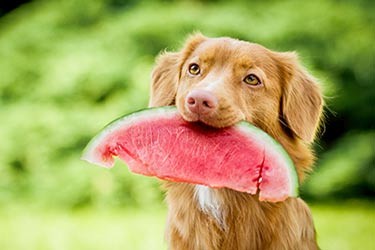Pet Friendly Summer Fruits and Vegetables

If you’ve never asked a client if they treat their dog with people food, you should! Chances are good that the response will be a “Yes!” and the most likely reason will be “It’s just so difficult to ignore those pleading eyes!” This helpful list features people-healthy fruits and vegetables that can also be offered as safe treats for dogs!
Fruits and Vegetables that Make Good Dog Treats
Apples
- Not only do apples provide vitamins A and C, they are also low in protein and fat which makes them good snacks for overweight, sedentary, and senior dogs
- Clients need to be reminded to remove the core and seeds before offering as a snack
Bananas
- High in vitamins, fiber, and potassium, yet low in cholesterol and sodium; bananas are good for dogs and most find them delicious
- Because they have a high sugar content, clients should be advised that even though their pup begs for more, bananas should only be given as a treat
Blueberries
- Beneficial in so many ways, blueberries are good for dogs
- Full of fiber and rich in antioxidants, blueberries are a healthy treat choice
Broccoli
- Raw broccoli is good for a dog, but only the stem
- The head and florets contain a toxin which can cause gastrointestinal problems
- The stem, however, contains plenty of fiber and vitamin C, and is also good for helping to maintain clean teeth
Celery
- Known to freshen breath, celery contains the nutrients the body needs to fight cancer, and support heart health
- Celery is also full of vitamins A, B, and C, and many dogs enjoy it as a treat topped with peanut butter or cream cheese
- Advise clients to be careful when feeding a dog celery as it can be a choking hazard. Make sure the bites are sized appropriately and that the dog chews the celery well.
Cucumbers
- When used as a snack, cucumbers can provide a dog with vitamins B1, C, and K, and also supplements the diet with copper, magnesium, and potassium
- This vegetable is considered good for overweight dogs as it is capable of boosting energy levels and has relatively no carbohydrates, fats, or oils
Oranges
- While the taste of oranges may not appeal to all dogs, oranges are safe to use as a treat and are full of vitamin C
- Outside of the seeds, a dog can eat the entire fruit, however, suggest to clients that they remove the peel as it can be difficult to digest
Pears
- The skin of the pear is its healthiest part, so suggest that clients wash the fruit, but leave its skin intact
- It only takes a few chunks to provide a dog with beneficial vitamins C and K, copper and fiber
- Be sure to advise clients to remove the pit and pear seeds as the seeds contain small traces of cyanide which is capable of making a dog ill
Pineapple
- Once fresh pineapple is trimmed and cored it makes a really nice treat
- Full of vitamins, minerals, and fiber, pineapple also contains bromelain, an enzyme that supports a dog’s ability to absorb proteins
Potatoes
- With their high iron content, potatoes are a good treat to give to dogs every once in a while
- When raw they can cause stomach distress so clients should be advised to always cook them first
- Another tip to pass on is that any time potatoes are offered as a treat, they should be plain, not topped with butter and seasonings as most people enjoy
Strawberries
- One of the most popular summer fruits, fresh strawberries are chock full of vitamins and fiber, and can be used as a treat for dogs
- Remind clients of the strawberry’s high sugar content and suggest that they be given to a pet in moderation
Sweet Potatoes
- Full of fiber, beta carotene, and vitamins B-6 and C, dogs benefit from a treat of sweet potatoes
- Before being given to a dog, their preparation should be completed in the same way as regular potatoes, cooked and unseasoned
Watermelon
- As long as the rind and seeds are removed, watermelon can be offered as a safe choice for dog treats
- Full of nutrients, with no fat or cholesterol, its high water content also provides a way to help keep a dog hydrated on hot days
Remind clients that there is a difference between offering a dog a treat and providing their meal. Regardless of the benefit provided by eating fruits or vegetables, feeding too much may reduce the dog’s nutritional intake if the quantity of treats dilute its regular diet.
Looking for additional pet dietary information to pass on to clients? Contact your Covetrus Representative now at 855.724.3461.
Sources:http://www.akc.org/learn/dog-health/fruits-vegetables-dogs-can-and-cant-eat/
Need Regulatory Assistance
If you need help with regulatory or licensing issues, we're happy to help. We have a wide variety of resources to help you when issues arise.

Careers
Are you looking for a place to let your talents shine? At Covetrus, we help our practitioner customers better serve their patients and take pride in providing the best customer experience possible. Search our open positions to see our available opportunities.
Newsletter
Stay current with what’s going on with Covetrus, subscribe to receive our newsletter and email communications. Subscribers will receive the latest information in practice management, sales and marketing, animal health, and more.


Leave a comment